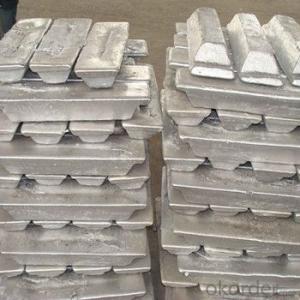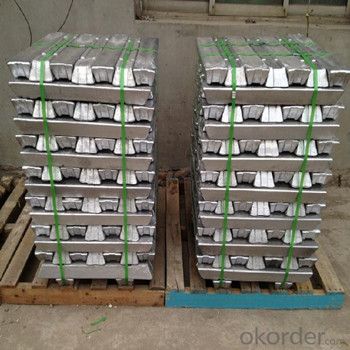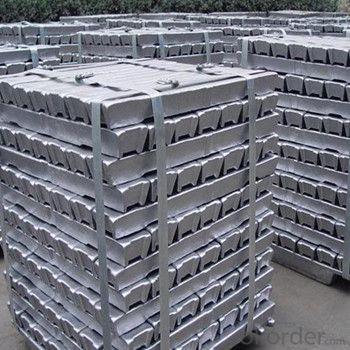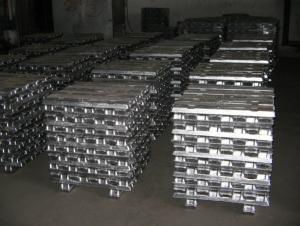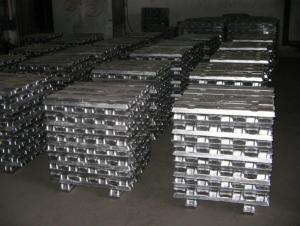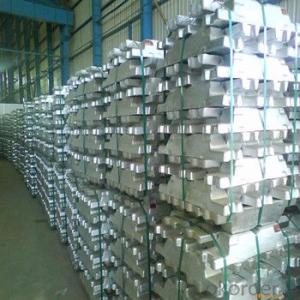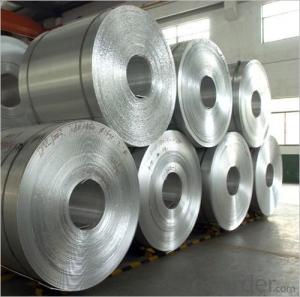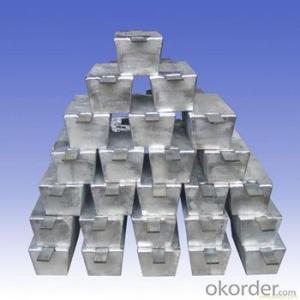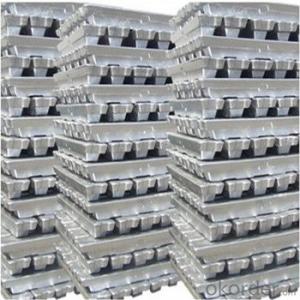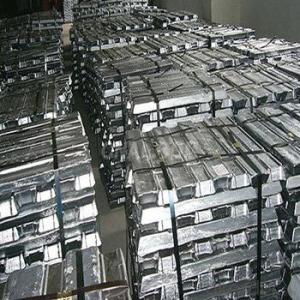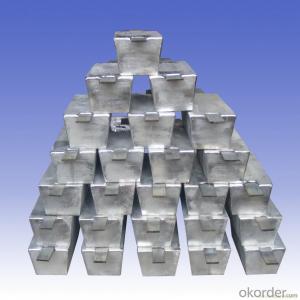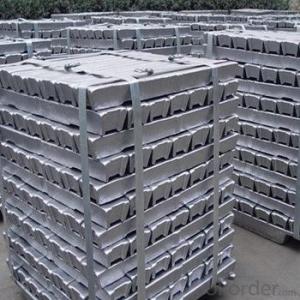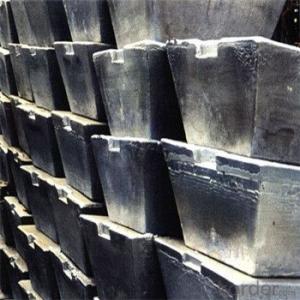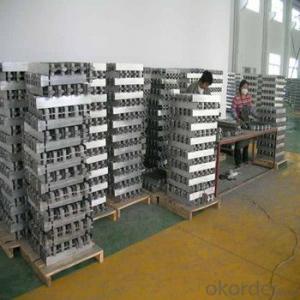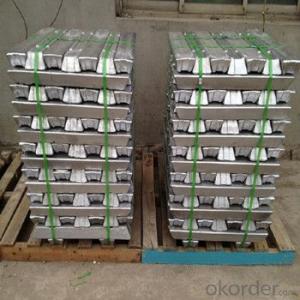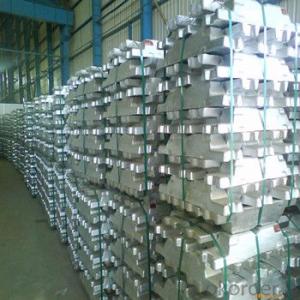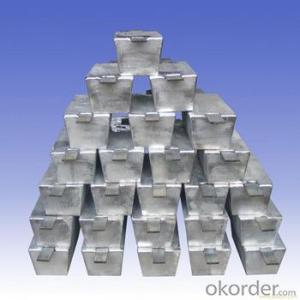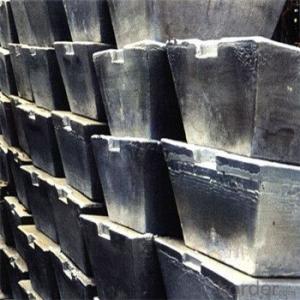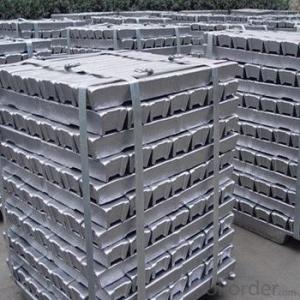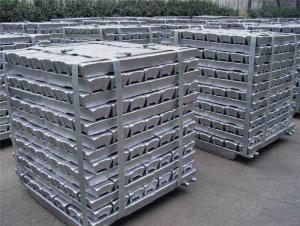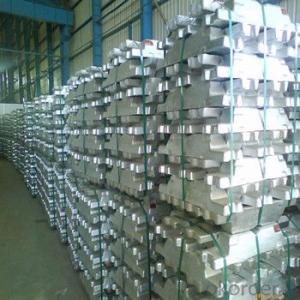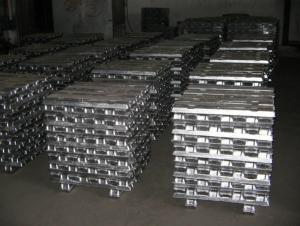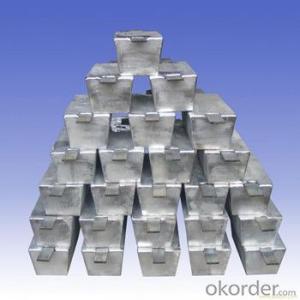Aluminum Pig/Ingot With High Purity And Best Price
- Loading Port:
- China main port
- Payment Terms:
- TT OR LC
- Min Order Qty:
- 1000 m.t.
- Supply Capability:
- 100000 m.t./month
OKorder Service Pledge
OKorder Financial Service
You Might Also Like
Pure Aluminum Pig/Ingot Used for Industry
1.Structure of Aluminum Pig/Ingot
A material that has been cast into a shape in order to be transported and processed easier than in an unprocessed form. An ingot is typically rectangular in shape, which allows it to be stacked. Ingots are most commonly associated with metals, with ingots of gold held in the vaults of banks and brokerages being popular images.
Aluminum Ingot is with the AL as the main chemical composition.Aluminum Ingot is used for industry,such as automobile,pinning and weaving,electron broadly and so on. Aluminum Ingot has the following advantages: easy control and operation, fast melting.
2.Main Features of the Aluminum Pig/Ingot
•High Purity
•Easy control and operation
•High strength
•Fast melting
•Competitive price
•Best Service
3.Aluminum Pig/Ingot Images
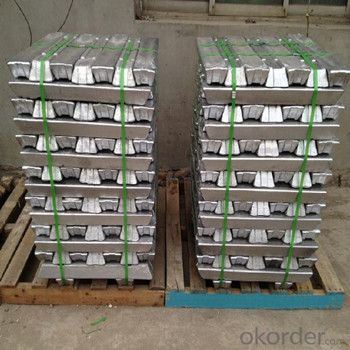
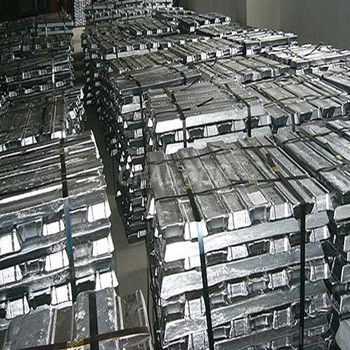
4.Aluminum Pig/Ingot Specification
Grade | Chemical Composition % | |||||||||
Al≥ | impurities ≤ | |||||||||
Si | Fe | Cu | Ga | Mg | Zn | Mn | others | Sum | ||
Al99.9 | 99.90 | 0.50 | 0.07 | 0.005 | 0.02 | 0.01 | 0.025 | - | 0.010 | 0.10 |
Al99.85 | 99.85 | 0.80 | 0.12 | 0.005 | 0.03 | 0.02 | 0.030 | - | 0.015 | 0.15 |
Al99.7 | 99.70 | 0.10 | 0.20 | 0.010 | 0.03 | 0.02 | 0.030 | - | 0.030 | 0.30 |
Al99.6 | 99.60 | 0.16 | 0.25 | 0.010 | 0.03 | 0.03 | 0.030 | - | 0.030 | 0.40 |
Al99.5 | 99.50 | 0.22 | 0.30 | 0.020 | 0.03 | 0.05 | 0.050 | - | 0.030 | 0.50 |
Al99.00 | 99.00 | 0.42 | 0.50 | 0.020 | 0.03 | 0.05 | 0.050 | - | 0.050 | 1.00 |
5.FAQ of Aluminum Pig/Ingot
We have organized several common questions for our clients,may help you sincerely:
①How about your company?
A big and famous and professional manufacturer & supplier of Aluminum Pig/Ingot, is one of the one of the large-scale professional investment Aluminum Pig/Ingot production bases in China.It have focuses on producing the Aluminum Pig/Ingot production for many years and gotten rich experience.Annually lagrge amount of Aluminum Pig/Ingot production are exported to markets in Europe,America and Japan. The quality and service have also gotten OEM service is available according to customer’s requirements.
②How to guarantee the quality of the products?
We have established the international advanced quality management system,every link from raw material to final product we have strict quality test;We resolutely put an end to unqualified products flowing into the market. At the same time, we will provide necessary follow-up service assurance.
③How long can we receive the product after purchase?
In the purchase of product within three working days, We will arrange the factory delivery as soon as possible. The pecific time of receiving is related to the state and position of customers.Commonly 7 to 10 working days can be served.
- Q: What are the different coating processes for aluminum ingots?
- Aluminum ingots can undergo various coating processes to improve their surface properties and protect against corrosion and environmental factors. Some commonly used coating processes for aluminum ingots include the following: 1. Anodizing: An electrochemical process is utilized to create an oxide layer on the ingot's surface. Anodizing not only provides excellent corrosion resistance but also allows for the application of dyes or paints to enhance the ingots' appearance. 2. Powder coating: Dry powder is applied to the ingot's surface and heated, resulting in the powder melting and forming a protective coating. This coating offers durability, aesthetic appeal, and resistance against corrosion, UV radiation, and chemicals. 3. Electrophoretic coating: Aluminum ingots are immersed in a paint solution that is electrically charged. The paint particles migrate to and deposit on the ingot's surface due to the electric field. Electrophoretic coatings provide excellent adhesion, corrosion resistance, and uniform coverage. 4. Chemical conversion coating: Aluminum ingots are treated with a chemical solution that reacts with the surface to create a protective coating. Common chemical conversion coatings include chromate, phosphate, and chromate-phosphate coatings. These coatings offer corrosion resistance and can serve as a base for paint or other decorative finishes. 5. Thermal spraying: A coating material, in the form of powders, wires, or rods, is heated and sprayed onto the ingot's surface. Thermal spraying results in a strong and durable coating that protects against wear, corrosion, and high temperatures. 6. Organic coatings: Liquid paints or lacquers are applied to the ingot's surface as organic coatings. These coatings provide a decorative finish and protect against corrosion and weathering. They are commonly used when aesthetics are a significant consideration. The choice of coating process depends on the specific requirements of the aluminum ingots and their intended application. Each process has its own advantages and disadvantages.
- Q: What are the dimensions of a typical aluminum ingot?
- The dimensions of a typical aluminum ingot can vary depending on the specific industry and application. However, a commonly used standard size for aluminum ingots is approximately 20 inches (50 centimeters) long, 6 inches (15 centimeters) wide, and 2 inches (5 centimeters) thick. These dimensions are not fixed and can be adjusted based on the requirements of the customer or the specific production process. Additionally, there are various other sizes and shapes of aluminum ingots available in the market, ranging from smaller sizes used for specialized applications to larger ingots used for industrial purposes.
- Q: How are aluminum ingots inspected for quality?
- Aluminum ingots are inspected for quality through various methods including visual inspection for surface defects, dimensional measurements, chemical composition analysis, and mechanical testing such as hardness and tensile strength evaluations. Additionally, non-destructive testing techniques like ultrasonic inspection and X-ray examination are employed to detect internal flaws and ensure the overall quality of the ingots.
- Q: What are the advantages of using aluminum ingots in the production of renewable energy systems?
- One of the advantages of using aluminum ingots in the production of renewable energy systems is their lightweight nature. Aluminum is a lightweight metal, which makes it easier to handle and transport during the manufacturing process. Additionally, aluminum is highly durable and resistant to corrosion, making it suitable for outdoor applications in renewable energy systems. Furthermore, aluminum is an abundant and recyclable material, contributing to the sustainability aspect of renewable energy production.
- Q: What does aluminium ingot blacken because of temperature? Rain? Aluminium oxide? Iron salt?
- Is the oxidation of alumina. The color is not necessarily to generate the first white alumina, then gray green, finally is black. Because there is water vapor. Laboratory control conditions, can certainly get white alumina. In reality are black.
- Q: What are the different surface treatments for aluminum ingots?
- Depending on the desired outcome and application, there are various surface treatments available for aluminum ingots. Some commonly used treatments include: 1. Anodizing: By creating a protective oxide layer, anodizing offers corrosion resistance, durability, and improved aesthetic appearance. 2. Powder coating: This treatment involves applying a dry powder to the ingot's surface, which is then cured under heat to form a protective and decorative coating. It provides excellent resistance to corrosion, fading, scratching, and offers a wide range of color options. 3. Polishing: Achieved through mechanical buffing, polishing creates a smooth and glossy finish. It enhances the appearance and improves corrosion resistance. 4. Brushing: This treatment utilizes abrasive brushes to create a textured or brushed finish, often for decorative or industrial purposes. It also provides corrosion resistance. 5. Chemical etching: By selectively removing material from the surface, chemical etching can create intricate patterns, logos, or text. It is suitable for branding or decorative purposes. 6. Clear coat: Applying a clear coat adds an extra layer of protection against corrosion while preserving the natural appearance of the metal. Clear coats often contain additives that enhance longevity. To determine the most suitable surface treatment for aluminum ingots, it is important to consider the specific requirements of the application and seek advice from professionals in the field.
- Q: How are aluminum ingots used in the automotive industry?
- Aluminum ingots play a crucial role in the automotive industry as they are widely used for manufacturing various components of vehicles. One of the primary applications of aluminum ingots is in the production of engine blocks. The lightweight nature of aluminum makes it an ideal material for engine blocks, as it helps to reduce the overall weight of the vehicle, thereby improving fuel efficiency and performance. Additionally, aluminum ingots are used in the manufacturing of wheels, transmission cases, cylinder heads, and other critical parts of the automobile. The high strength-to-weight ratio of aluminum makes it a preferred choice for these components, as it ensures durability and enhances the overall safety of the vehicle. Moreover, aluminum ingots are utilized in the construction of car body panels, such as hoods, doors, and trunk lids. Aluminum body panels offer significant weight reduction compared to traditional steel panels, leading to improved energy efficiency and handling. Furthermore, aluminum has excellent corrosion resistance properties, which helps to enhance the longevity of these body panels. In recent years, with the growing demand for electric vehicles (EVs), aluminum ingots have gained even more prominence in the automotive industry. EVs require lightweight materials to compensate for the heavy battery packs, and aluminum ingots provide the perfect solution. The use of aluminum in EVs not only helps to increase driving range but also improves battery life and enhances overall performance. In conclusion, aluminum ingots are extensively used in the automotive industry for their lightweight nature, strength, and corrosion resistance properties. They are vital components in engine blocks, transmission cases, wheels, body panels, and other critical parts, contributing to improved fuel efficiency, safety, and performance of vehicles.
- Q: What is the purity level of aluminum in an ingot?
- The purity level of aluminum in an ingot can vary depending on the specific manufacturing process and the intended application. Generally, aluminum ingots are produced with a purity level of 99.7% to 99.9%. This means that the ingot is composed of at least 99.7% to 99.9% pure aluminum, with the remaining percentage being made up of impurities and trace elements. Achieving higher levels of purity, such as 99.99% or even 99.999%, is possible through additional refining processes like electrolysis. The desired purity level is determined by the specific industry or application in which the aluminum will be used, as certain industries may require higher levels of purity for optimal performance and quality.
- Q: I would like to ask, aluminum water poured into the mold, what should pay attention to? Aluminum solidification in the mold after the aluminum ingot, how can I get it out?
- One side of the mold is generally provided with a push plate, and the two modules are connected by hinges, and the other end is provided with a clip to prevent the aluminum water from expanding into the cavity.
- Q: How are aluminum ingots used in the production of railway components?
- Due to their unique properties and benefits, aluminum ingots play a crucial role in the production of railway components. They are melted down and serve as raw material for manufacturing various railway parts. One major use of aluminum ingots in railway components is seen in the construction of lightweight yet durable train bodies. The high strength-to-weight ratio of aluminum makes it an ideal material for building train carriages and panels. By utilizing aluminum ingots, manufacturers can create lightweight structures that are easier to transport and require less energy to operate. This not only reduces fuel consumption but also contributes to a more sustainable and eco-friendly transportation system. Furthermore, aluminum ingots are utilized in producing other railway components like doors, windows, and flooring. These components need to possess strength, resistance to corrosion, and the ability to withstand harsh environmental conditions encountered in railway operations. Aluminum, being highly resistant to corrosion, offers exceptional protection against weathering, ensuring the longevity and reliability of these components. In addition, aluminum ingots find application in the production of electrical components for railways. Aluminum's excellent electrical conductivity makes it suitable for manufacturing overhead power lines, conductor rails, and electrical connectors. These components are vital for ensuring efficient power transmission and distribution throughout the railway system. To conclude, aluminum ingots are vital for the production of railway components. Their lightweight nature, strength, corrosion resistance, and electrical conductivity make them ideal for manufacturing train bodies, doors, windows, flooring, and electrical components. By utilizing aluminum ingots, the railway industry can achieve improved efficiency, durability, and sustainability in their operations.
Send your message to us
Aluminum Pig/Ingot With High Purity And Best Price
- Loading Port:
- China main port
- Payment Terms:
- TT OR LC
- Min Order Qty:
- 1000 m.t.
- Supply Capability:
- 100000 m.t./month
OKorder Service Pledge
OKorder Financial Service
Similar products
Hot products
Hot Searches
Related keywords
